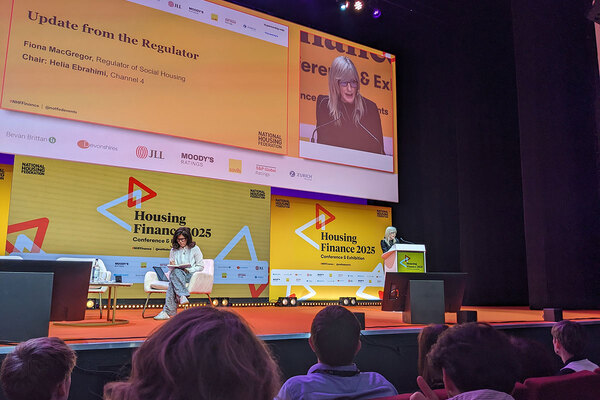Legal and General Affordable Homes becomes first for-profit RP to gain compliant regulatory grades
Legal & General Affordable Homes (LGAH) has become the first for-profit provider to be given compliant grades from the English regulator, while a Manchester-based housing association has been downgraded to V2.
The Regulator of Social Housing (RSH) has given LGAH, which owns nearly 2,000 properties, the top gradings of G1* for governance and V1* for viability.
In line with the regulator’s previously announced policy, the gradings have an asterisk to denote an assessment relating to a for-profit provider in view of “qualitative” differences between these and non-profit providers.
The RSH confirmed to Social Housing this is the first standalone compliant regulatory judgement for a for-profit.
In November, Hyde Housing Association, which includes for-profit Halesworth as a subsidiary, was given the (compliant) grades of G1/V2.
LGAH’s top grades follow fellow for-profit providers being found non-compliant by the regulator.
In December, for-profit Heylo Housing was downgraded to non-compliant gradings of G3 and V3 after an investigation found “issues of serious regulatory concern”, and Auxesia Homes was found to have broken the economic standards.
LGAH is part of the Legal & General Group (LAG Group), but was only assessed as a standalone entity.
The regulator said, following its in-depth assessment (IDA), it had assurance LGAH complies with the financial elements of its Governance and Financial Viability Standard.
The RSH said in its report: “Its financial plans are consistent with, and support, its financial strategy.
“The provider has an adequately funded business plan, sufficient security in place, and is forecast to continue to meet its financial covenants under a wide range of adverse scenarios.”
According to the report, LGAH owned 1,950 properties as at November 2022, and had also sold 938 properties to a sister RP focussed on affordable rent.
The RSH said LGAH was protected from some financial risks through its intergroup arrangements, meaning it purchases properties at a fixed cost based on an independent valuation and benefits from protections that cap losses from void properties.
The regulator said LGAH had a capital structure with a “significant proportion” of its funding provided by way of equity investment from its parent rather than debt finance.
The RSH said this provided assurance that it could maintain its financial viability without putting social housing assets at undue risk.
LGAH had demonstrated compliance with its liquidity policy, which was designed to ensure there was always access to liquidity, the regulator added.
The RSH said LGAH has a track record of arranging funding solutions from within the Legal and General group of companies (L&G Group). LGAH monitors, reports on and complies with its loan covenants, the regulator added.
The RSH said that stress-testing of LGAH’s business plan had shown that covenant compliance can be maintained in a wide range of downside scenarios.
Based on the evidence gained from the IDA, the regulator said it had assurance that LGAH’s governance arrangements met the requirements on governance set out in the Governance and Financial Viability Standard.
The RSH said: “The regulator has assurance that the governance arrangements enable it to adequately control the organisation and to continue to meet its objectives.”
The regulator said that while LGAH was a subsidiary organisation within a group of companies, its governance framework established “clear roles and responsibilities for its board and contains appropriate probity arrangements”.
The RSH said: “LGAH can demonstrate that it has taken steps to ensure that the arrangements it has entered into do not inappropriately advance the interests of third parties.”
The regulator said this included the use of independent information that the board has the legal right, and budgetary control, to procure to support its decision-making.
It said LGAH had the same board members as the other four registered providers that are fellow subsidiaries of its parent company, L&G Group.
However, the RSH said governance arrangements had been structured so that board and sub-board decisions can be made in LGAH’s interests without advancing the interest of one group registered provider over another inappropriately.
Ben Denton, chief executive of LGAH, said: “We are pleased with the Regulator of Social Housing’s rating of Legal & General Affordable Homes.
“We look forward to continuing to work with the sector to address current and future societal challenges – growing the choice, quality and sustainability of affordable housing.”
One Manchester
Elsewhere, the RSH downgraded One Manchester from V1 to V2 for viability and maintained the social landlord’s existing G1 grade for governance.
The regulator said that based on evidence from a stability check and through reactive engagement, the housing association, which manages over 12,000 homes, continues to comply with the financial viability elements of the Governance and Financial Viability Standard.
The RSH said: “One Manchester has an adequately funded business plan, sufficient security in place and is forecast to continue to meet its financial covenants under a reasonable range of scenarios.”
However, the regulator said that the housing association was “significantly” investing in its existing homes.
It said this increase, coupled with economic uncertainty in relation to inflation, interest rates and rent increases, meant that One Manchester had “weakened interest cover ratios and reduced capacity to respond to adverse events”.
This is the same reasoning behind the majority of the RSH’s wave of viability downgrades from V1 to V2 in November and December.
The regulator said that its assessment of One Manchester’s governance compliance remained unchanged and, since its last IDA, the social landlord had identified and addressed “a number of governance issues”.
The regulator said: “Based on the evidence from our reactive engagement and the stability check, the regulator has assurance that One Manchester’s governance arrangements enable it to adequately control the organisation and to continue meeting its objectives.”
Nicole Kershaw, chief executive of One Manchester, said: “The regrade, which is very common across the sector at the moment, reflects the current economic climate paired with our continued ambitions and commitments to significantly invest in our homes.
“We’re really pleased to remain in a strong position to deliver for our customers and respond to these external challenges.”
RELATED








